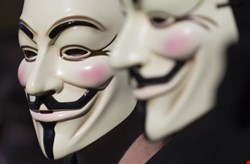
Breaking this news, NBC points out that this makes "the British government the first Western government known to have conducted such an attack." One slide from the presentation, headed 'DDoS Rolling Thunder' quotes from the anonops IRC: "was there any problem with the irc network? i wasn't able to connect the past 30 hours."
'Speakeasy' replied: "yeah, we're being hit by a syn flood, I didn't know whether to quit last night, because of the ddos."
One problem with DDoS is that it is a blunt weapon of attack. "According to cyber experts," notes the NBC report, "a DDOS attack against the servers hosting Anonymous chat rooms would also have shut down any other websites hosted by the same servers, and any other servers operated by the same Internet Service Provider (ISP), whether or not they had any connection to Anonymous. It is not known whether any of the servers attacked also hosted other websites, or whether other servers were operated by the same ISPs."
Furthermore, for every law-breaking Anonymous hacktivist there are thousands of law-abiding supporters who treat 'membership' of the group as nothing more than an expression of dissent. Their use of the IRC channels would be entirely legal, and in the US at least guaranteed by the constitution; but a DDoS attack cannot distinguish, and their right to freedom of expression removed.
The news is polarizing views. “No one should be targeted for speech or thoughts, but there is no reason law enforcement officials should unilaterally declare law breakers safe in the online environment,” said Michael Leiter, former head of the US National Counterterrorism Center and now an NBC News analyst.
But writing in Wired Opinion, Gabriella Coleman comments, "Whether you agree with the activities of Anonymous or not... the salient point is that democratic governments now seem to be using their very tactics against them." She points out that Anonymous activists end up in court but GCHQ "can do as they please" and does not end up in court – even though both sides use the same tactics. "And it’s this power differential that makes all the difference."
Coleman believes the implications of such actions are serious. "Scores of Anonymous hacktivists have already been arrested or jailed. Meanwhile, agencies like GCHQ face no such risks, deterrents, consequences, oversight, or accountability... And that means," she fears, "we’re inching into the same territory as the dictatorial regimes criticized by democratic governments for not respecting internet freedoms."
GCHQ responded to NBC's queries with an insistence that it operates within the law. "All of GCHQ's work is carried out in accordance with a strict legal and policy framework,” said the statement, “which ensure[s] that our activities are authorized, necessary and proportionate, and that there is rigorous oversight, including from the Secretary of State, the Interception and Intelligence Services Commissioners and the Parliamentary Intelligence and Security Committee."